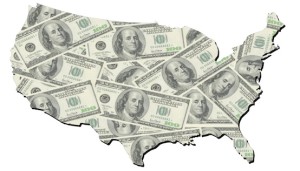 Legislation has been gaining momentum that would increase the federal minimum wage to $10.10 from $7.25. Many cities and states are already looking into increasing their minimum wages above $10 and Seattle has even proposed $15 an hour. Currently, there are twenty-two states and D.C. that have minimum wages higher than the federal level. Many are left wondering what this will mean for businesses and how it could effect employment numbers.
Legislation has been gaining momentum that would increase the federal minimum wage to $10.10 from $7.25. Many cities and states are already looking into increasing their minimum wages above $10 and Seattle has even proposed $15 an hour. Currently, there are twenty-two states and D.C. that have minimum wages higher than the federal level. Many are left wondering what this will mean for businesses and how it could effect employment numbers.
Several large companies including McDonald’s, Starbucks and Chipotle have already joined in the conversation claiming they would support raising the minimum wage. According to the Chicago Tribune, McDonald’s CEO Don Thompson supports the minimum wage hike and said that even though their current base pay would have to double to meet a minimum of a proposed $15, the company will be fine. Chipotle already pays its employees an average of $9 an hour so a bump up to $10 would not have a significant effect on business. Other companies like Ikea and Gap are not waiting for a federal increase they have already vowed to raise their wages within the next year. (1)
Michael Reich, a professor of economics at the University of California, Berkeley said that businesses can look to offset pay increases in other ways, like raising the prices of goods and services. It’s an increase that few consumers would notice. Also, with higher wages, employees stay longer in their positions which means employers don’t have to spend time and money hiring and training new employees. (2)
But what about companies that aren’t as large as a company like McDonald’s? Small businesses, particularly in food service and hospitality, would not able to increase their pay by so much, or double it in some cases. The National Restaurant Association has opposed mandatory minimum wage rules saying that increasing pay would hurt a still struggling economy and discourage hiring. If the minimum wage were to rise, businesses that could not absorb the cost would be forced to lay off employees. “When you’re talking about a $10 and $15 minimum wage, that has the potential to increase our labor costs 10 to 20 percent,” says Don Davey, a representative for Firehouse Subs, a Jacksonville, Florida-based chain, which includes 760 locations in 41 states.(2)
A recent Congressional Budget Office report looked at the implications of raising the minimum wage at two different levels, to $9 and to $10.10. Raising the minimum wage to $10.10 would have a bigger impact on employment, with an approximate one million workers losing their jobs in 2016 as opposed to 500,000 workers losing their jobs with an increase to $9.
It’s inevitable that businesses will be effected by a minimum wage increase but at what degree is still up for debate. Small businesses may struggle and lay off current employees while large corporations probably won’t feel it at all. While increasing the minimum wage would give low wage workers higher pay and would raise some of them above the federal poverty level, there will be a loss of jobs, but how many remains to be seen.
More resources:
Department of Labor Mythbusters
Sources:
(1) How Feel-Good Companies Are Navigating the Minimum-Wage Fray
(2) What Will Happen To The Economy if We Raise The Minimum Wage?
Photo credit: www.mint.com

 We are extremely pleased to announce that Dresser & Associates has joined Net@Work, one of the most respected Sage Software Partners in North America and an award-winning end-to-end technology solutions provider. You will see very little change relative to your Sage Software support, really just a name change.
We are extremely pleased to announce that Dresser & Associates has joined Net@Work, one of the most respected Sage Software Partners in North America and an award-winning end-to-end technology solutions provider. You will see very little change relative to your Sage Software support, really just a name change.








